What's eating West Cork's fishermen?
Flotillas of fishing boats at protests in Cork and Dublin caught the public's attention this summer, but West Cork's fishermen say the problems they face still threaten their very way of life.
They had been gathering at the mouth of Cork Harbour since dark.
As the sun appeared up over the east Cork sea in the early morning of May 26, so too did the black dots of fishing trawlers, set against the horizon.
A few at first; a flotilla was forming in Roches Point. It was there they met, waiting for the full complement to gather. The brighter the sun, the more the numbers grew. They came from all around our coast.
By noon, they had steamed their way from the Port of Cork into the heart of the city, past Spike Island, Cobh, and past the old Blackrock Castle before sailing up the River Lee to land.
Upon arriving, they would collect themselves and march their way to the constituency office of Micheál Martin in Turners Cross and hand-deliver a letter, carrying a message saying, “the Irish fishing industry is dying.”
Salt in the blood
“I’d say if they took a blood sample, they’d find a bit of salt inside in it,” Patrick Murphy says with a laugh, telling me about his family's background.
Patrick is the CEO of the Irish South and West Fish Producers Organisation.
Months after the Cork flotilla, we meet for a chat by the Skibbereen Rowing Club before he brings me for a stroll around Hegarty’s Boatyard, about three kilometres away. While walking and talking with Patrick at these pinnacles of Cork’s maritime culture, it's hard not to sense what he holds dear to his heart.
Patrick’s father was Danny Murphy from Heir Island, an avid fisherman and one of the three original founders of Skibbereen Rowing Club.
Patrick began fishing with his father at eight, and over the years he’s handled shrimp pots and developed an aquaculture farm. He offers tours around the islands off Baltimore. All this happens from Roaring Water Bay in West Cork, near where he grew up and still lives.
As you’d imagine, he has an intricate understanding of Irish fishing and is a kind of unofficial spokesman for the industry as a whole. Often appearing on the various media platforms, he tries to let the public understand how Ireland is failing to utilise the natural resources available to us.
He believes that our government understands this too, and that bigger European fishing companies are waiting in the wings to buy out the Irish fisherman, a move that he says will decimate every coastal community around the country.
Losing a way of life
Back when Patrick finished school, fishing was an attractive business. Coastal communities had a vibrancy. You could make money.
“Most people were leaving West Cork and emigrating, but I stayed around to go fishing,” he says.
These days, the decommissioning of vessels is being talked about more and more. What’s being discussed here is the winding down of the Irish fishing industry as a whole.
Part of the reason for the Cork and Dublin flotillas, Patrick says, was to show city-dwelling, non-fishing communities the investment that has gone into the Irish fleet, the pride that fishermen and women take in their vessels.
These weren’t a motley assortment of dilapidated wrecks steaming into port, but an array of well-kitted-out, freshly painted, professionally manned vessels representing an investment of time, money, bank loans: representative of a way of life that’s demanding a viable future.
“We brought our fleet to Cork and Dublin to show the people the modern fleet that we have and to ask people: pick a boat that you think is for the scrap heap,” he says. “Because they aren’t there.”
“Robbed by Europe”
Ireland has some of the best and most fertile fishing grounds in Europe.
The main fish species found here are mackerel, horse mackerel, boarfish, blue whiting, herring, cod, whiting, haddock, saithe, hake, megrim, anglerfish, plaice, sole and Nephrops.
1.2 million tonnes of fish are taken out of Irish waters each year, the vast majority by other European countries.
“Has Ireland the richest fishing grounds in Europe, yes or no?” Patrick asks rhetorically. “Yes. The water around our coast is shallower than other European countries and the temperature is right, so it's perfect for spawning.”
So why is a country whose fishing fleet is working out of the richest fishing grounds in Europe now at risk of being put out of business?
Brexit: fishermen “thrown to the wolves”
Europe used Ireland's fishing grounds as a bargaining chip during Brexit negotiations, to allow for mutual tariff-free access between the EU and the UK post-Brexit.
The UK demanded to reclaim €173m in fishing rights from Europe, and they got it.
The bulk of this was their own fishing rights that they had previously lost within their own waters as an EU member-state, and the rest came from Irish waters: we paid €43m.
Ireland had no representatives at the Brexit negotiations; they had trusted Michel Barnier, the European Commission's Head of Task Force for Relations with the United Kingdom, to negotiate on their behalf. It didn’t work out.
“Ireland was promised that they would be looked after in the Brexit deal, that Michel Barnier had our interests at heart,” Patrick says. “They said they would link trade to the fishing industry and that we weren’t going to be cut off from it. In other words, if they didn’t agree to a trade deal, then they wouldn’t agree to a fishing deal. But the reverse happened. They agreed a trade deal, and then the fishermen got thrown to the wolves.”
Prior to Brexit, the UK had access to 50% of the fish in their own waters and Ireland had access to 20% of the fish in their water. In the Brexit negotiations, the UK demanded that they reclaim up to 75%. Michel Barnier made them an offer of 18% but the UK wanted more. They wanted greater access to Mackerel, Irish Herring and Nephrops. But they were all Irish fish.
Of the 25% of extra fish demanded by the UK, 5% would end up coming from Ireland's fishery. The 5% sacrificed by Ireland came to 20% of what Ireland was allowed to catch overall. This means Ireland is left with access to 15% of fish stocks in its own waters.
The remaining 20% of fish sought by the UK came from eight other countries. What Ireland paid in the Brexit negotiations was hugely disproportionate.
“We were told that one of the reasons why this happened was because of our proximity to Britain. We were robbed by Europe,” Patrick says.
Patrick estimates that one in five vessels will have to decommission because of this, leaving plenty of opportunity for the bigger European companies to hoover up Irish vessels.
It’s not just the loss of a business, it’s potentially the loss of a way of life that’s certainly one of the very first ways humans were able to eke out a living on this grey rock in the Atlantic.
As Patrick and I chat, most of the residents around the area are still flying Irish and Olympic flags on their front lawns, in homage to Olympic gold medalists Paul O‘Donovan and Fintan McCarthy. Pride in their homegrown heroes and the rowing club they represent is fierce.
Our maritime culture in sport is widely celebrated. Yet our fishing culture generates little to no excitement. Fishing seems almost forgotten about amongst the general public. Very few young Irish people are taking up the notoriously dangerous and physically demanding career. Many fishing crews employed in Ireland are from countries like the Philippines, Egypt or Portugal.
The Seaspiracy effect?
Horrifying levels of by-catch, marine plastic waste, exploitative labour practices, species being driven to extinction: when the documentary Seaspiracy was released last spring, it portrayed commercial fishing as no more or less than a full-blown global ecological disaster and cast doubt on any notion of sustainable fishing.
Why should we even care that the industry is struggling? Wouldn’t the planet just be better off without commercial fishing, full stop?
Many have pointed out that Seaspiracy, made by vegan film-maker Ali Tabrizi, has massively over-simplified a complex issue. Some of those who appear in the film even claim to have been deliberately misrepresented. But it did highlight some areas of enormous concern.
Patrick says it's unwise to believe that the Irish fishing fleet is in the same league as those who were featured in the Seaspiracy documentary.
“We are the role models in Europe,” he says. “There’s more regulation following our fishing industry than any other country in the world. Why didn’t the makers of the programme come here to see how we’re doing things? Sure, what was in the documentary needed to be seen, but it was a very one-sided programme.”
Conservation
According to some global studies, 10% of all marine life caught ends up thrown overboard as by-catch. (Seaspiracy erroneously claimed 40% based on an NGO’s report that later corrected itself.)
But by-catch is on a downward trend. In the 1950s, by-catch accounted for about 5 million tonnes annually, but this ballooned alongside technological innovations to a peak of 18.8 million tonnes in 1989. It’s been declining ever since and is currently at 10 million tonnes per year.
Irish fishermen are, by all accounts, trying to play their part in this process. It’s in their interests to make fishing sustainable, many of them will tell you.
Damien Turner operates a trawler out of Castletownbere, the Roisín Caitriona. Over the years, he has worked with Bord Iascaigh Mara (BIM) on various conservation and sustainability projects.
The t90 codend study was one such project.
Damien worked with BIM to trial so-called t90 fishing nets, which have larger diamond circumferences. Its aim was to study the numbers of younger fish that could be prevented from being caught at sea with the use of wider nets.
“Conservation-wise, there is no point killing the small fish,” Damien says. “Any fisherman will tell you the same thing. We need to be able to fish every year and we need them to grow. That study was a great success and further trials are in the pipeline.”
“We’re continuously looking at different conservation measures, and in fairness, I have to say of the Irish fleet; we are leaders in it. The spawning grounds are off our coast, so it’s up to us to maintain them. We need fish to survive.”
When it comes to overfishing, back at Hegarty’s boatyard, Patrick defends his industry robustly. Convictions for over-fishing are “few and far between,” he says.
“Our industry has seven different regulatory organisations overseeing what we do. If someone says a fisherman does it on purpose, I disagree. They throw their net out and do everything they can, moving ground to avoid an overfishing scenario. But it does happen that people catch the wrong fish, there are measures put in place to correct that. The fishermen shoot their nets and do their best but are sometimes criminalised by the system they operate in.”
Patrick explains that in essence overfishing doesn’t happen because stocks are addressed at a Europe-wide level. They look at the stock in its entirety. If Ireland catches 10% over a particular fish quota in the year, it will then swap that 10% with another country who hasn’t caught 10% of the same species.
Ghost nets
Another massive issue is that of marine waste, with the fishing industry contributing up to 40% of all ocean plastics globally, and so-called “ghost nets” - dumped nets which continue to catch and kill marine life - a problem worldwide, including off the Irish coast.
“Our fishermen from the Irish South and West Fish Producers Organisation as well as other fishermen from Ireland have been working with BIM as a part of their Clean Oceans initiative,” Patrick tells me. “So far, they’ve caught close to 600 tonnes of plastics out of the sea; you can see it all online.”
Nets are expensive and precious, Patrick points out.
“Are you telling me that a fisherman will go down to the net-makers and pay twenty-five or thirty thousand euros, and just throw it away? These men keep these nets and repair them because they cost too much money to discard, and they use them over and over again.”
He admits that some nets do get discarded. But he doesn’t believe Irish fishermen are to blame.
“Are nets being discarded? Yes,” he says. “But look at the type of nets, look at the nets themselves, see the sizes of them. And then you trace it back to who’s discarding them. It comes down to economics. If you have a net that's thin and it's cheaper to produce than what you’ll make fishing, you’ll throw it away.”
“But look at who’s using the thin nets, look at the type of material, it's easy to find it out, just go down to the pier and look into the boats”
Who is using the thin nets?
“Well it ain’t the Irish. Wouldn’t it be stupid for an Irish fisherman to dump their nets and have them wash ashore?”
Trawling the sea floor.
“We look for food in all manner of places. A farmer will plough a field and kill the grass., Then they’ll plant seeds and grow crops. Are they wrong for ploughing a field?”
Does the malpractice of dredging the seabed happen in Irish waters?
“It’s not a malpractice. It’s what you do, it’s like ploughing the field. Are you saying it does damage? Well, here’s a question: they’ve been doing it for thousands of years, going back to the same places. If they’re doing damage, why haven’t they turned it into a desert?”
Illegal immigrants and exploitation
Seaspiracy highlighted how illegal immigrants were working as virtual slaves on board vessels in the southern oceans.
Irish consciousness was raised when it came to light that Wexford vessel The Elle Adhamh had hired a number of undocumented Egyptian crew. It was brought to light when the vessel got into difficulty; its seven crew were winched to safety after it lost power during a massive storm in March of this year.
There are many non-European Economic Area workers on Irish trawlers, but there are many misconceptions about their work status, or mischaracterisation of them as exploited, often coming from the fact that non-fishers don’t really understand the work of fishing.
On a trawler, rest periods are sporadic for all crew members: scheduling breaks is well-nigh impossible because when the fish are in, everyone’s working. Rest and sleep come only when the gruelling work of landing the catch is done.
Years after the tragic loss of five crew including three Egyptians and the captain, Michael Hayes, when the Tit Bonhomme sank off Glandore, Michael’s daughter Lia ní Aodha hit out at allegations of widespread abuse within the industry, saying that documentation issues should not be conflated with exploitation.
Before a non-European Economic Area worker can come to Ireland to work in fishing, a 12 month contract should be drafted up through a solicitor.
Patrick explains that the system in its current guise allows a fisherman a 12 month contract; a non-EEA worker must go home at the end of that contract in order to qualify to get another visa.
However, oftentimes the situations they left behind are too dangerous for them to go home and the fishing community has been lobbying the government to address this.
“The guys who came here did so through a system that's not fit for purpose,” Patrick says. “If a nurse from the Philippines comes to Ireland for a five-year contract, they can work in nursing for five years and they and their partners can more or less do what they want when that time is up.”
“But if a fisherman comes from the Philippines to work in fishing, he must go home after 12 months and try to get back in.”
The owners of the Elle Adhamh say they had the wheels in motion to secure documentation for their Egyptian workers, but that they got so far in the process before being stalled.
Pier-side weighing: a new source of anger
Mistrust of the Irish fisherman is something the industry deals with on an ongoing basis.
In April of this year, a new weighing system was introduced, whereby Irish fishermen are ordered by the Sea Fisheries Protection Authority (SFPA) to weigh their catch on the pier side upon arriving back from sea. The rule was brought in because of a suggestion that the weight of the catches was being manipulated at the factories.
At Union Hall in West Cork, I meet up with Bosco Mac Gearilt, to hear about his experience of the new process. It’s one of immense frustration.
Upon landing, the fish are taken out of the ice boxes to be weighed inside the truck on the side of the pier. Bosco says it damages the freshness of the catch, making it softer than usual.
“The other countries don’t have to do it, so why should we have to?” Bosco asks.
Why does he think the rule was brought in? He’s non-committal: “Any time the government wants to bring in a rule, they just do it. They don't consult with fishermen at all.”
At Union Hall it's warm, dry and a bit humid. How does Bosco feel about weighing the catch today?
“It's crazy that we’re doing this,” he says. “Would the government turn around to the farmers and ask them to expose their meat in the warm weather to weigh it? I don’t think so - they’d be told where to go. Fish should not be handled twice before going to market.”
Bosco thinks the new rule is unworkable and doomed.
“It can’t work,” he says. “If you’re trying to sell a product and the product is not going to be good because of what we’re doing right now, how are you going to compete with the other countries? They won’t want your fish.”
Patrick Murphy admits that incidents of scale-tampering are what’s behind the new weighing rules, but he says these instances were a small number of cases, some dating back 15 years. He thinks it’s deeply unfair that all fishermen are now bound to such an impractical and risky process as a result.
“It's like punishing everyone for drunk driving over the few who have done it,” he says.
What next for Irish Fishing?
With so many grievances, West Cork’s fishermen are clearly feeling embattled, and at this stage, they feel it’s not long before their way of life, such a deeply ingrained part of Irish culture and heritage as an island nation, is lost.
Patrick says Europe is giving Ireland money to buy fishermen out. They see the long-term value of the rich Irish fishing waters, but want them for the big companies. He says they did the same with our sugar.
“Where will it stop? Will the farmers be next?” he asks.
“We have right on our side. These are our waters; these are our fish, that they have a right to share with us, not take from us. What's happening is wrong. We have a resource available to us that could allow us to print money, but we are being robbed.”
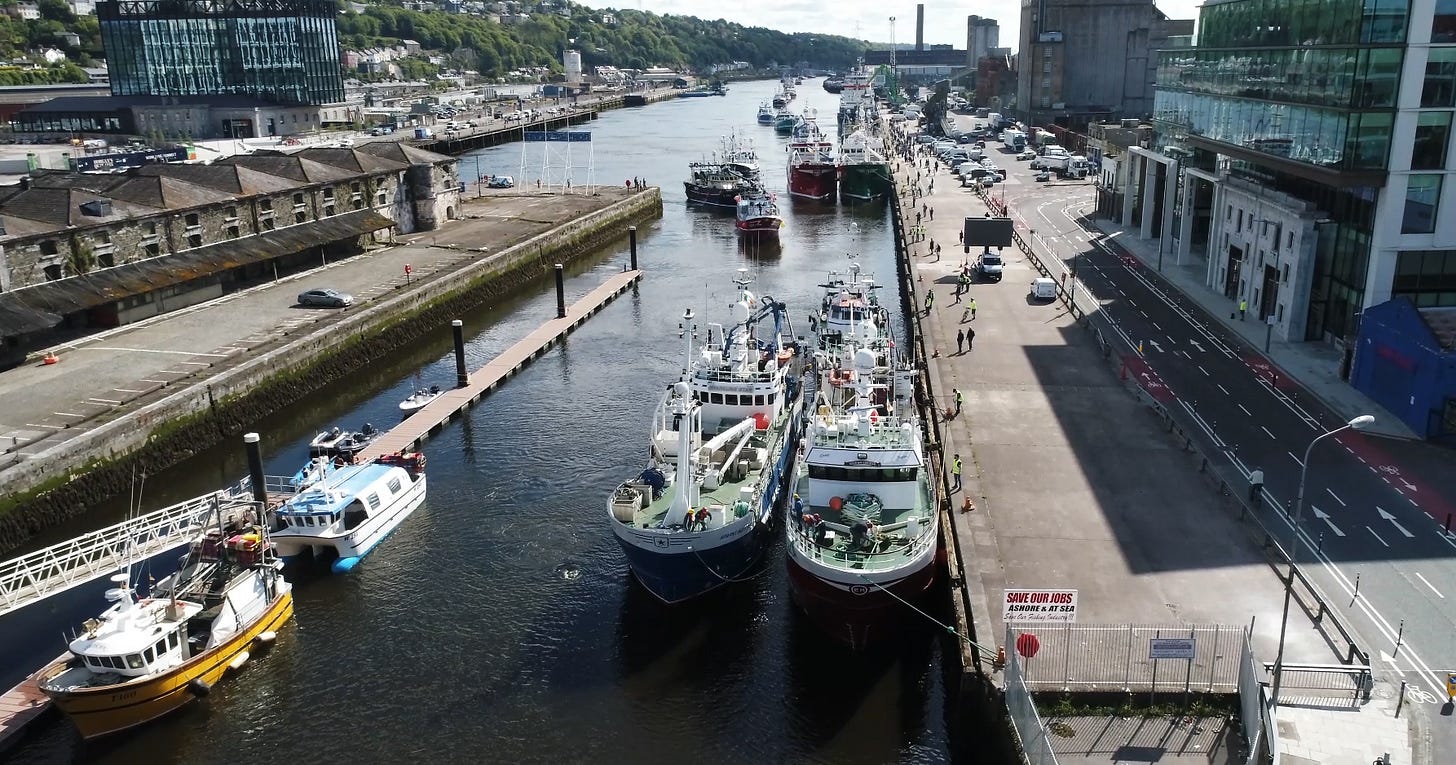
The Cork and Dublin flotillas were organised partially to let the fishermen voice their frustration; to allow them vent a little. They didn’t want to block the ports like they did during a similar protest in the ‘90s, but Patrick says a situation may even arise in the future when the Irish fleet sets sail on another flotilla, this time to block the ports in Europe.
He assures me that there are no plans for that at present. But, he tells me, nothing is being ruled out.

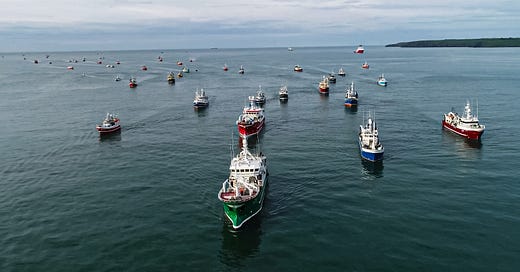



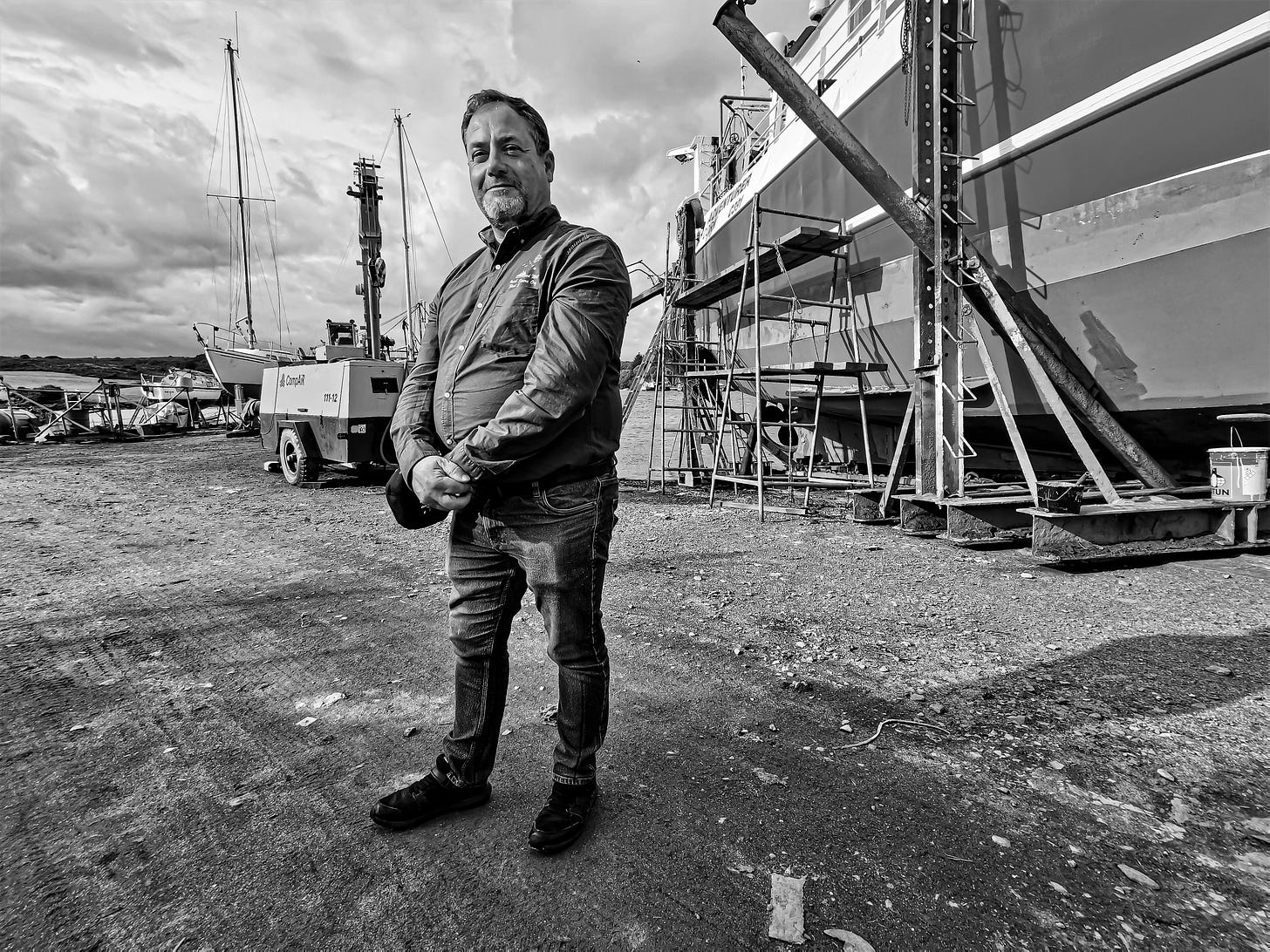
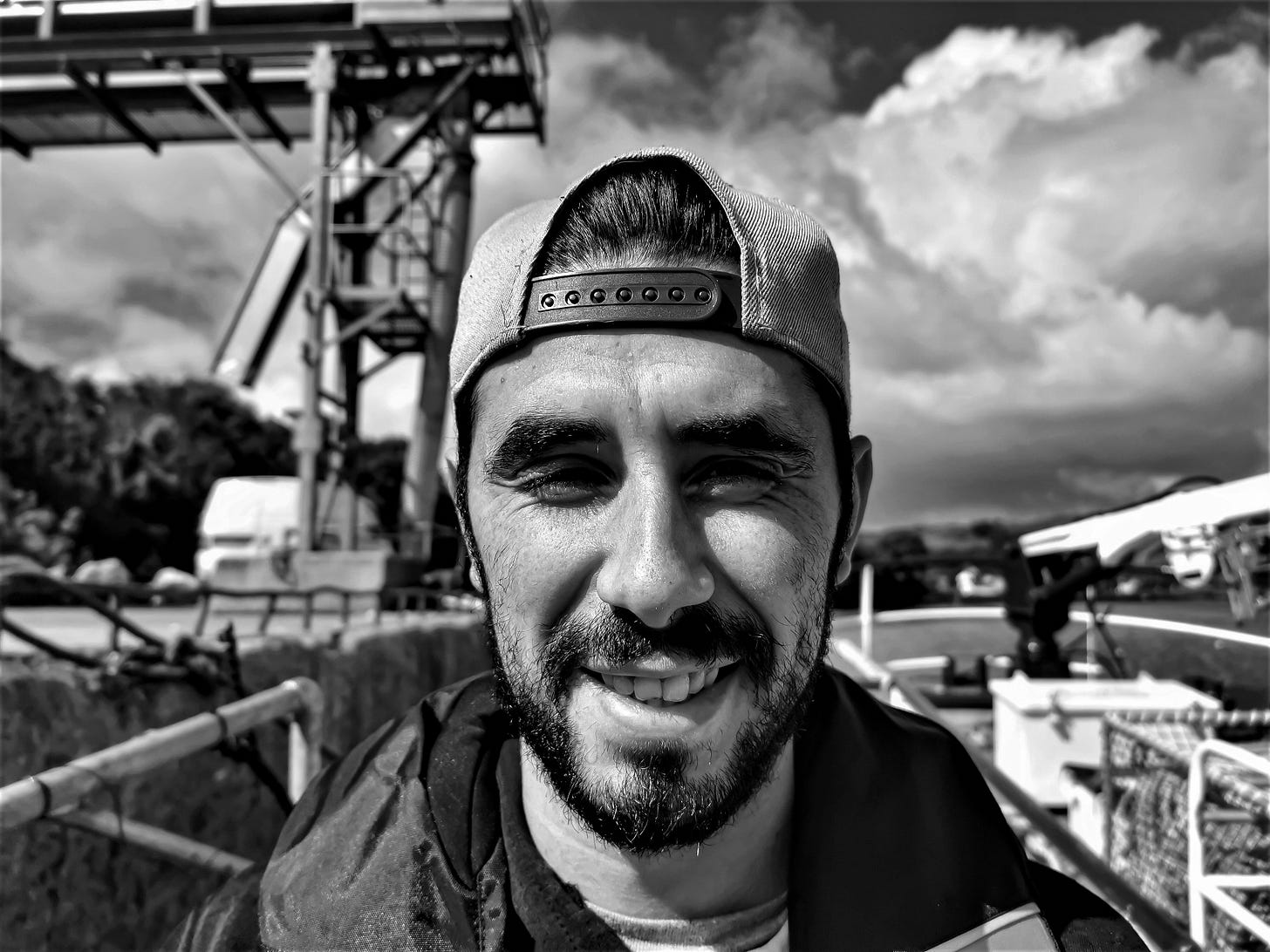
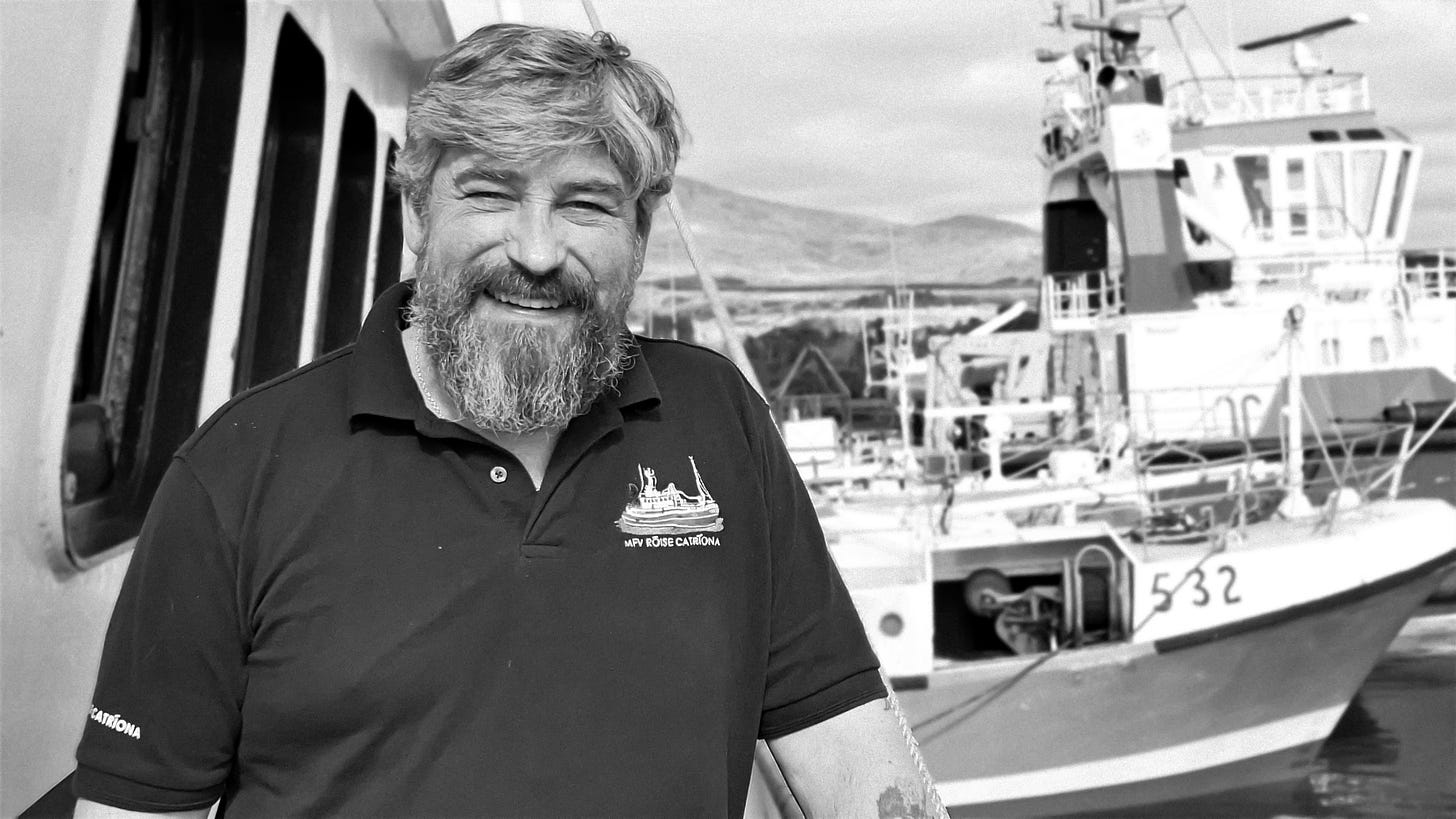

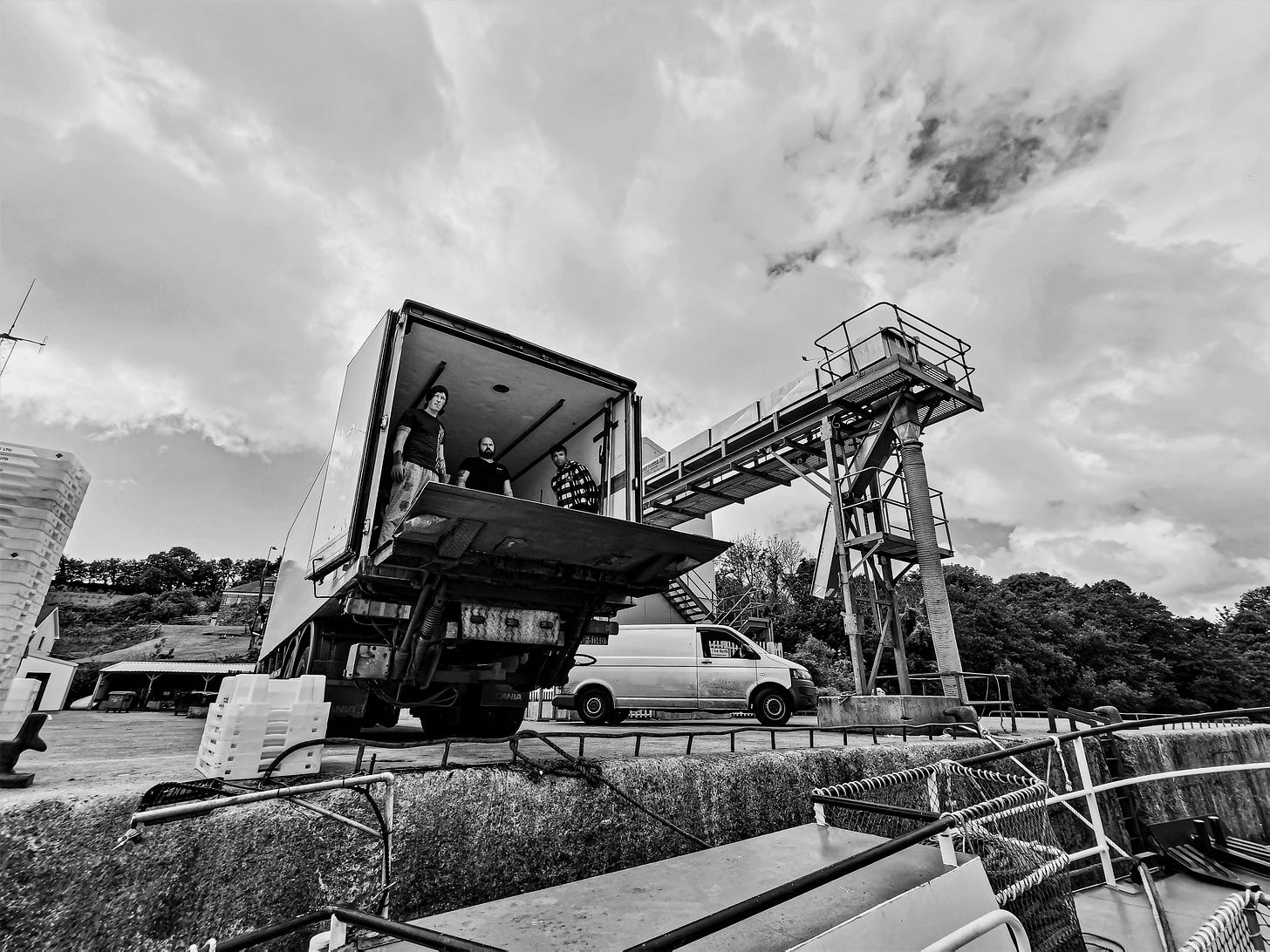

Interesting take. On trawling: the argument that it’s like ploughing a field shows a staggering lack of understanding of the difference in scale and frequency of now versus then on top of increased fragility of systems under stress from climate change. Bottom trawling for scallops is illegal because it destroys the entire ecosystem. Yet it still goes on in SACs like Blacksod in Mayo. Illegal immigration and exploitation of undocumented workers needs to be dealt with so good you highlight this, and fishermen (thanks for not using the hideous word “fishers”) and women obviously need a just transition from an industry that must allow for more marine recovery. Redeploy and reimagine rope farming for mussels, etc. It is a notoriously corrupt industry. Killybegs has a fierce reputation. You probably need a sheriff to wade in and clean things up. Who, though?